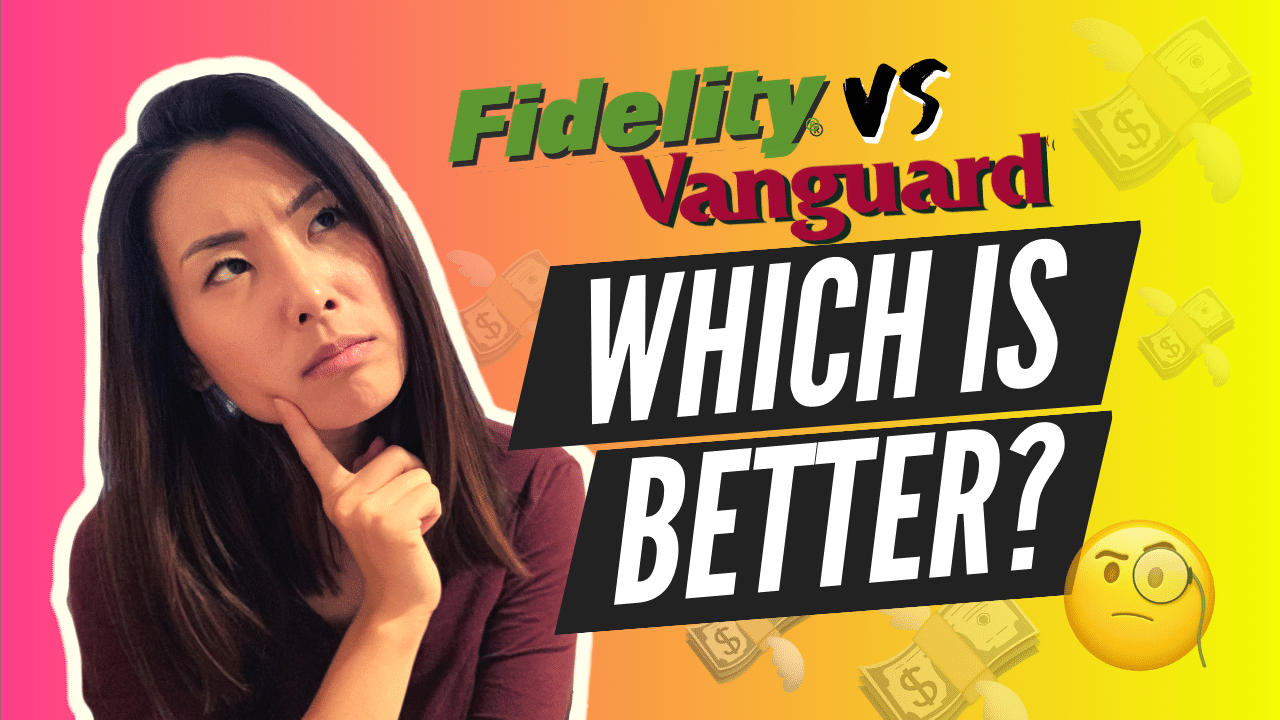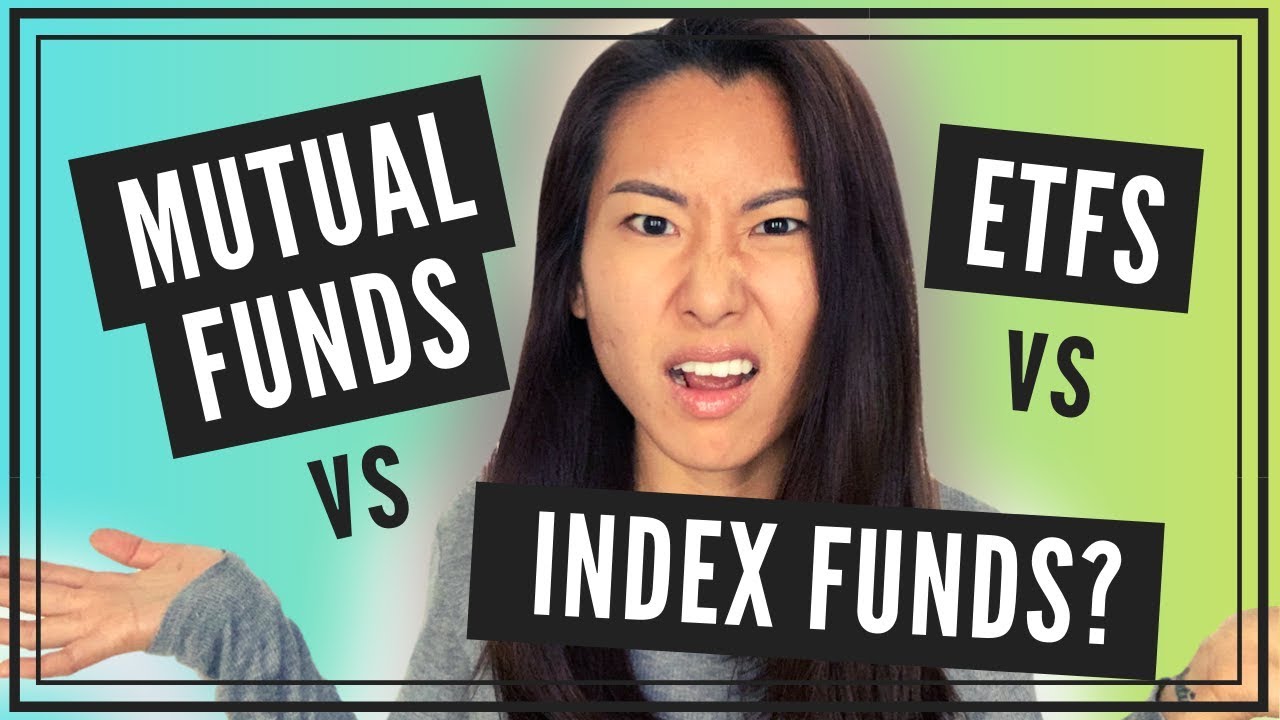No more staying up till 2:00 AM trying to compare brokerages because the more time you waste stuck in analysis paralysis, the less time your money is invested and actually working for you. When it comes to longterm investing, Fidelity or Vanguard are the ultimate.
I’ve had experience using both of these platforms and I recently decided to go all in with Fidelity so if you’re wondering whether to go with Fidelity versus Vanguard for your investments, I have some thoughts to share with you.
What is up everyone. I’m Rose and welcome back to my channel, the number one place for financial education, empowerment and inspiration. A couple of months ago I talked a little bit about Fidelity versus Vanguard in this video right here and that video is specifically about the best places to open a Roth IRA and I wanted to go more in depth here especially because there’s been some exciting new changes ever since I made that video.
The first one being that in the fall of 2019, Fidelity announced commission free trading of all stocks, bonds, and options. Overall, Fidelity definitely favors the average investor, where anyone of any account size can enjoy $0 fees and commissions. Whereas at Vanguard, the more money you have, the more favorable treatment you get in terms of fees and commissions.
On the Vanguard website, you can see that anyone with $1 million or more gets free stock trades. And even then that’s limited to just the first 25 transactions. After that, it’s not free. So if you’re not quite at the $1 million mark yet, which let’s be real is the vast majority of us, Fidelity is much more friendly for the small size investor.
Whether you open an account at Fidelity with $1 or $1 million, all your stock, ETF, and options trades are going to be 100% free, 99. I do want to give Vanguard some credit though. Vanguard has, for a long time, been the O.G. of passive investing. In other words, investing in low cost index funds or ETFs.
Jack Bogle, the founder of Vanguard was one of the first people to speak out against the financial services industry and how it was basically robbing people of their hard earned money with high fees and all these crazy things that they were charging. We can all thank Vanguard and Jack Bogle for setting the standard for all the companies in the industry and keeping everyone honest.
So until fairly recently if you wanted to buy a super low cost mutual funds or ETFs, Vanguard really was your go to. But not anymore. In an effort to catch up to Vanguard, Fidelity has drastically improved it’s mutual fund and ETF offerings as well. So much that they even came out with their zero funds, which have 0% expense ratios, so that means with their Fidelity zero funds, you can buy mutual funds for free and not pay a fee to have your money invested in that fund.
My video right here walks you through exactly how to do that, so make sure to check out my video on Fidelity zero funds right here. Other than Fidelity’s zero funds, pretty much any other fund that you compare side by side with Vanguard is going to have lower fees.
Comparison of Fidelity index funds to Vanguard index funds
Let me show you what I mean right here on the Fidelity website. So this is a page that compares Fidelity index funds to Vanguard index funds side-by-side. And as you can see, it’s pretty interesting. They’ll show you each fund with the Fidelity expense ratio and then the expense ratio for Vanguard’s equivalent version of the fund. And you’ll see here of course, they’ve probably intentionally pick the funds that make them look good, but still, for example, this is the S&P 500 fund. If you invest through Fidelity, it’s an expense ratio of 0.015%, Vanguard’s same fund charges, an expense ratio of 0.04%. so Fidelity is a little bit better.
And what’s even more interesting and significant is that Vanguard, a lot of their funds have a minimum investment $3,000 so if you want to invest less than that, then you won’t be able to invest with Vanguard. So again, that’s going back to the whole idea of Fidelity being much better for the smaller investor. And Vanguard, their fee structures and minimums tend to favor bigger investors. So as you can see here, all of Fidelity’s index funds have a $0 minimum investment. And that literally means if you have $1 to invest, you can invest with $1, you can buy $1 of this fund.
So let’s see other funds, they’ve got the total market index fund, which is investing in not just the 500 large caps that are in this fund here, but investing in small cap, mid cap companies as well. And they just go down the list. All kinds of stock market funds, small cap index fund, then there’s international funds, global ex-U.S. Blah blah, blah. Emerging markets. They even have a real estate index fund. And of course Vanguard has the equivalent as well.
And then going down to bonds, if you wanted it to balance out your portfolio with something more stable than stocks and you could do some bonds, US bonds, municipal bonds, short-term intermediate, and so on and so forth. So basically you have all the funds you need right here to build a complete portfolio. So if you can do that either at Fidelity or at Vanguard, why not go with the place where you can do it at the lowest cost, paying the lowest expense ratios.
What about Account Fees and other features?
Something else I didn’t mention. Account fees. Fidelity does not charge any account fees. You can open an account for totally free. Vanguard, on the other hand, charges a $20 annual maintenance fee. There are ways to avoid that fee like signing up for electronic delivery of documents and stuff like that, but still, I don’t like the idea of a brokerage firm charging you to keep your money with them.
To me that’s like if a hot girl is on a date with a guy and the guy who wants to charge her $20 to be there, he should be stoked to be on a date with a hot girl and doesn’t make any sense to charge her $20 to be there. I know it’s a silly example, but I’m trying to make a point here. Brokerages they have many other ways to make money off of your business and I really don’t think charging you a fee just to have an account with them, really makes a lot of sense.
And just so you know, this video isn’t sponsored. I literally just did some digging compared to everything side-by-side between Fidelity versus Vanguard and found that Fidelity does better for its users on fees, commissions, everything, especially if you’re starting off small. Another key difference between Fidelity versus Vanguard is that Fidelity has more features for trading and active investing.
If you’re planning to buy and sell stocks pretty often or do other kinds of active styles of investing such as magic formula investing or you’re more of a trader type, then Fidelity is going to be good for you because they have a separate trading application called Active Trader Pro, which as you can see you can download on your desktop and it looks really fancy. It has real time price quotes, not lagged price quotes, and all these charting features and all of that. Something else I’ve noticed about Fidelity is that they do something called price improvement.
This means that whenever you buy stocks, Fidelity will try to get you the best price possible and they’ll pass on any improvement in price to you versus keeping it for themselves. A lot of brokerages that claim to be cheap or free, a lot of them won’t pass those kinds of savings onto you and they’ll keep it for themselves as profit instead. That’s why trading execution at the brokerage that you choose is so important.
I’ve seen this firsthand. Here’s a little screenshot of the price improvement history in my Fidelity account. To be fair, Vanguard’s website also says that they do price improvement and I used to have my 401(k) with Vanguard until I rolled it over to Fidelity and all it had in there was one mutual fund, so my experience with the nuts and bolts of Vanguard’s trading execution is limited, so they may do price improvement. I just haven’t experienced it myself firsthand.
So once again, Fidelity, I think, has very, very robust features for whichever type of investing or trading you want to do. On the other hand, Vanguard as robust with people who want to do active trading. It really is for buy and hold investors.
They don’t have a separate trading application like Fidelity does and there’s really nowhere to see real time streaming price quotes and charts, and obviously their $7 stock trading commission isn’t exactly geared for anyone who plans on buying and selling stocks frequently, but if all you want to do is buy some really low cost index funds like Vanguard’s popular VT stocks and you want to hold them until you become a granny and just cash out when you’re really old, then Vanguard is going to be just fine for you.
And you know what? The fact that Vanguard isn’t good for hands on trading might actually be a good thing. Because the vast majority of people, myself included, overestimate their ability to time the market. So obsessing over price charts and looking at all these streaming realtime price quotes and you’re trying to get in and out of stocks at a profit, it’s generally a losing proposition.
Best strategy for long term investing success.
Buy and hold really is the best strategy for long term investing success. So if all you want to do is index fund and chill, then Vanguard is a good option. That’s not to say Fidelity isn’t good for longterm investing because it absolutely is. It offers all the benefits of Vanguard and more. All I’m saying is that the added temptation of knowing you can trade stocks for $0 commission whenever you want, might not be the best thing for you.
As for me, I like keeping my options open, so I have most of my stuff at Fidelity. I have several different accounts there and I do a different investing strategy in each. So I have my HSA where I do my passive index fund investing. I also have my SEP IRA there where I do sort of a active style of investing called the magic formula, and I have my Roth IRA there and that’s where I do some of my individual stocks and value investing and a little bit of options trading. So I’m able to do three very different types of investing all on the Fidelity platform. So that’s why I like Fidelity so much.
Moving right along to account types offered at each platform. There’s not a whole lot to compare here because both Fidelity and Vanguard offer all the basic accounts. Rollover IRAs, traditional IRAs, IRAs, SEP IRAs, taxable brokerage accounts, et cetera, et cetera. However, one account type that Fidelity offers, that Vanguard does not, is the HSA or health savings account. This is an account that allows you to save and invest pretax money to use towards health related expenses. HSAs are the ultimate triple tax loophole because you save on taxes when you contribute and you save on taxes because you don’t pay any capital gains tax or income taxes and you save on your withdrawals.
I talk more about this awesome wealth building tool right here in this video and there are some special requirements in order to qualify for an HSA such as having a certain type of health insurance plan. But if you can get an HSA and invest inside of that, you totally should. Vanguard unfortunately doesn’t do HSA, so for that reason alone, I prefer Fidelity. Not only this, but Vanguard doesn’t offer a whole lot in the way of cash management.
So Fidelity offers a cash account that is basically a checking account. And it comes with a debit card and mobile check deposit and all that good stuff. At some point I even had a Fidelity credit card. So literally Fidelity can be your one stop shop for all your banking and investment needs. So do you want a one stop shop like Fidelity where you can do passive and active investing strategies and do all your banking stuff? Or do you prefer to separate your banking stuff from your investing stuff? It’s up to you.
Finally, I want to touch on some qualitative differences between Fidelity versus Vanguard. Vanguard has a unique ownership model where the company is owned by the investors of Vanguard’s funds, rather than by outside shareholders. So if you own a Vanguard mutual fund, you effectively own a little piece of Vanguard as a whole. In other words, Vanguard is owned by the people and for a long time this is exactly why Vanguard was able to charge the lowest fees in the industry. Since there’s no outside owners to distribute profits to Vanguard funds, charge only enough to cover their costs and they pass on all the savings to its fund holders.
Fidelity, on the other hand, is structured like most other for profit companies, where its customers are not necessarily its owners, but I also don’t see this as a problem as long as Fidelity continues to offer low fees and in a lot of cases Fidelity’s fees are lower than Vanguard, so I really don’t see this as a problem anymore. Also, just as a fun fact, Fidelity is run by a female CEO, Abigail Johnson. So that’s a huge plus in my book.
In Summary
Here are my final recommendations to wrap it up. If you’re looking for a robust investing platform that supports all kinds of strategies, whether they’re active or passive, Fidelity is your answer. And if you’re starting out small with just a couple thousand dollars or even just a couple hundred dollars, you’ll want to go with Fidelity to avoid any account fees, investment minimums, and trading commissions. If you’re looking for a place that also offers checking account features so you can keep all your financial stuff in one place, then go with Fidelity. If all you want to do is hold a few index funds for the longterm and you can get around the investment minimums, the account fees, then go with Vanguard.
I think I’m a little biased towards Fidelity, but I’ve done my best to provide a side by side comparison so that you can set up your accounts ASAP and actually get started investing.






